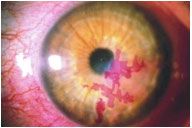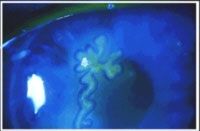Herpes Simplex Virus Dallas Fort Worth
Herpes simplex virus (HSV) is a member of the viral family Herpesviridae. Other members of this family that are familiar to most people include varicella-zoster (chickenpox and shingles) and Epstein-Barr virus (mononucleosis). There are two types of HSV that commonly infect humans: type 1 (HSV-1) and 2 (HSV-2). It is generally HSV-2 that causes infection below the waist (genital herpes) whereas HSV-1 generally causes infection above the waist (fever blisters, ocular involvement). Roughly 85% of ocular infection is caused by HSV-1. Note should be made however, that when the infection involves the neonate, the causative organism is usually HSV-2.
 Many patients look for sources of contact, when in fact the initial exposure to the virus probably took place at a very early age. Most of us are exposed to the herpes virus during childhood. In fact, about 90% of adults are positive for prior viral exposure. This is called the primary infection. The herpes virus behaves differently from most other viruses. Usually, when confronted with a viral infection, one’s immune system is very effective at killing and eradicating intruding substances. The herpes virus however, is unique in that it possesses viral latency. This means that HSV has the ability, once inside the host, to go into hibernation, usually in specific nerve tissue, and to become active at a later date. Often the initial viral involvement is a skin infection or a fever blister, whereas the recurrent infection may involve the eye. In fact, there are about 500,000 cases of HSV involving the eye each year in the United States alone. Another aspect of this viral latency is the ongoing risk of recurrent disease, a hallmark of ocular HSV. This means that once an individual manifests ocular HS, he or she has an ongoing risk of experiencing additional episodes. This can be as high as 10% at one year, 23% at two years, and 63% at twenty years. Unfortunately, the extent of ocular scarring and damage increases with each successive episode. Another peculiar tendency of herpes virus is that it usually affects only one eye. In fact, this is true 90% of the time. Individuals with bilateral disease usually either had ocular disease as a child or have other risk factors such as atopic skin disease.
Many patients look for sources of contact, when in fact the initial exposure to the virus probably took place at a very early age. Most of us are exposed to the herpes virus during childhood. In fact, about 90% of adults are positive for prior viral exposure. This is called the primary infection. The herpes virus behaves differently from most other viruses. Usually, when confronted with a viral infection, one’s immune system is very effective at killing and eradicating intruding substances. The herpes virus however, is unique in that it possesses viral latency. This means that HSV has the ability, once inside the host, to go into hibernation, usually in specific nerve tissue, and to become active at a later date. Often the initial viral involvement is a skin infection or a fever blister, whereas the recurrent infection may involve the eye. In fact, there are about 500,000 cases of HSV involving the eye each year in the United States alone. Another aspect of this viral latency is the ongoing risk of recurrent disease, a hallmark of ocular HSV. This means that once an individual manifests ocular HS, he or she has an ongoing risk of experiencing additional episodes. This can be as high as 10% at one year, 23% at two years, and 63% at twenty years. Unfortunately, the extent of ocular scarring and damage increases with each successive episode. Another peculiar tendency of herpes virus is that it usually affects only one eye. In fact, this is true 90% of the time. Individuals with bilateral disease usually either had ocular disease as a child or have other risk factors such as atopic skin disease.
How is HSV treated?
 HSV diagnosis is usually based on history and typical clinical appearance on examination. Occasionally, the diagnosis is aided by laboratory studies. The treatment, however, is much more complicated. In fact, treating individuals with ocular HSV is one of the most challenging conditions seen by the average ophthalmologist. This is because the virus can affect the eye many different ways and the appropriate treatment may vary not only from individual to individual but also, episode to episode. The following are ways HSV can affect the eye:
HSV diagnosis is usually based on history and typical clinical appearance on examination. Occasionally, the diagnosis is aided by laboratory studies. The treatment, however, is much more complicated. In fact, treating individuals with ocular HSV is one of the most challenging conditions seen by the average ophthalmologist. This is because the virus can affect the eye many different ways and the appropriate treatment may vary not only from individual to individual but also, episode to episode. The following are ways HSV can affect the eye:
- Blepharitis (eyelid and surrounding skin)
- Epithelial or surface disease (dendritic)
- Post-infectious ulcers (metaherpetic)
- Stromal disease (involving the middle layer of the cornea)
- Uveitis (inflammation of the inside of the eye)
Also, often times an individual may have more than one type of involvement at any given time. HSV is usually treated with topical medications, such as ganciclovir and trifluridine; sometimes, it may require anti-viral agents and topical corticosteroids. In addition, there are several systemic antiviral drugs (acyclovir, valacyclovir, foscarnet) that can be used to treat the virus.
To learn more about herpes and its effects on the eye, please contact us today.


